Yi Jing Hexagram 3 - Line 4
The hexagram: 3
An hexagram is a combination of six yin and yang lines.

3.4 (3 > 17) - THE KUN HEXAGRAM
The fourth line, divided, shows (its subject as a lady), the horses of whose chariot appear in retreat. She seeks, however, (the help of) him who seeks her to be his wife. Advance will be fortunate; all will turn out advantageously.
Bing DeepL Google Yandex3.4 (3 > 17) - Knowing how to behave correctly
One will get help if they wait until others send an invitation.
Bing DeepL Google Yandex3.4 (3 > 17) - Knowing how to behave correctly
One will get help if they wait until others send an invitation.
Bing DeepL Google Yandex3.4 (3 > 17) - T’un, la difficulté initiale
T’un et tchun : A. 1. Bourgeon, pousse ; 2. Croissance, activité ; 3. Grandir, avancer. — B. Difficultés, arrêté dans son avancement, échec.
Si elle est demandée en mariage selon les rites, qu’elle y aille et ce sera bien. Cela lui sera avantageux.
Il en est de même de l’équipage arrêté qui reprend sa course.
3.4 (3 > 17) - Savoir se tenir correctement
On obtiendra de l'aide si l'on attend que les autres envoient une invitation.
Bing DeepL Google YandexThe trigrams
The trigrams are combinations of three yin and yang lines. The three bottom lines of the hexagram form the lower trigram and represent the inner situation. The three top lines form the upper trigram and represent the outer situation.
trigSup2


trigInf

The nuclear hexagram: 23.3.5 (23 > 53)
The nuclear hexagram is the association of the two inner trigrams (lines 2,3,4 and 3,4,5). It represents the root, or the origin of the situation.

23.3.5 (23 > 53) - THE PO HEXAGRAM
- 3. The third line, divided, shows its subject among the overthrowers; but there will be no error.
- 5. The fifth line, divided, shows (its subject leading on the others like) a string of fishes, and (obtaining for them) the favour that lights on the inmates of the palace. There will be advantage in every way.
23.3.5 (23 > 53) - Casting a wide net
One prepares more ideas so as not to be caught off guard.
Bing DeepL Google Yandex23.3.5 (23 > 53) - Casting a wide net
One prepares more ideas so as not to be caught off guard.
Bing DeepL Google Yandex23.3.5 (23 > 53) - Poh, l’écroulement
Poh : opprimer, renverser, traiter durement.
- 3. Renverser, faire crouler quelque chose sans suite regrettable. C’est quand on le fait légitimement et pour bonnes raisons. C’est que cela atteint également grands et petits (ou abandonne).
-
5. Le prince généreux envers les gens du palais (litt.(/i] : qui enfile des poissons pour en faire présent), en retirera des avantages certains.
Peut-être devrait-on admettre déjà ici l’élément figuratif et symbolique, et voir dans l’hexagramme la figure du prince (ligne pleine supérieure) au-dessus de ses officiers rangés comme des poissons séchés et traduire : avoir des officiers comme des poissons enfilés. Alors, il s’agirait de [i]p’o, gens du palais.
23.3.5 (23 > 53) - Ratisser large
On prépare davantage d'idées pour ne pas être pris au dépourvu.
Bing DeepL Google Yandex23.3.5 (23 > 53) - Lepusztulás
- 3. Nem törődik a többiekkel többé.
- 5. Látja mi nem működik.
The derived (Fan Yao)
The same line number on the mutated hexagram. It reperesents what can be done AFTER to correct the situation described by this line, as a sort of remedy or solution.

17.4 (17 > 3) - THE SUI HEXAGRAM.
The fourth line, undivided, shows us one followed and obtaining (adherents). Though he be firm and correct, there will be evil. If he be sincere (however) in his course, and make that evident, into what error will he fall ?
Bing DeepL Google Yandex17.4 (17 > 3) - Inviting one's admirers
When one has obtained benefits, others want one to be generous.
Bing DeepL Google Yandex17.4 (17 > 3) - Inviting one's admirers
When one has obtained benefits, others want one to be generous.
Bing DeepL Google Yandex17.4 (17 > 3) - Sui, suivre
Sūi : 1. Respect, soumission, conformité à ce qui doit être ; 2. Complaisance ; 3. Fidélité au devoir ; 4. Conséquemment, en ce cas.
Ce qu’on obtient par complaisance (blâmable) est d’un profit funeste ; quand on est sincèrement droit et qu’on reste dans la voie de la vérité, on acquiert de grands mérites.
Quel regret pourrait-on craindre ?
17.4 (17 > 3) - Inviter ses admirateurs
Quand on a obtenu des avantages, les autres veulent que l'on soit généreux.
Bing DeepL Google YandexThe juncture: 18.3
The derived of the reciprocal. It represents what could have been done BEFORE to prevent the situation described by this line, as a sort of remedy or solution.

18.3 (18 > 4) - THE KÛ HEXAGRAM.
The third line, undivided, shows (a son) dealing with the troubles caused by his father. There may be some small occasion for repentance, but there will not be any great error.
Bing DeepL Google Yandex18.3 (18 > 4) - Interfering in other people's business
One sees the negligence of a relative, so they take the opportunity to help them.
Bing DeepL Google Yandex18.3 (18 > 4) - Interfering in other people's business
One sees the negligence of a relative, so they take the opportunity to help them.
Bing DeepL Google Yandex18.3 (18 > 4) - Kù, l’élimination de la chose pourrie
[color=blue]Kū : délibération, embarras, trouble, soucis.
Il n’aura jamais grande faute à regretter, ni grand reproche à subir (et cela jusqu’à la fin).
Bing DeepL Google Yandex18.3 (18 > 4) - Se mêler des affaires des autres
On voit la négligence d'un proche alors on en profite pour l'aider.
Bing DeepL Google Yandex18.3 (18 > 4) - Rendetlenség
Látva egy közelálló hanyagságát, megragadja az alkalmat hogy segítsen neki.
Bing DeepL Google YandexThe reciprocal: 4.3
The hexagram upside down. It represents the opposite situation, and as such is insturmental when validating comments.

4.3 (4 > 18) - THE MĂNG HEXAGRAM
The third line, divided, (seems to say) that one should not marry a woman whose emblem it might be, for that, when she sees a man of wealth, she will not keep her person from him, and in no wise will advantage come from her.
Bing DeepL Google Yandex4.3 (4 > 18) - Questioning
Do not give in to the impatience of the youngest.
Bing DeepL Google Yandex4.3 (4 > 18) - Questioning
Do not give in to the impatience of the youngest.
Bing DeepL Google Yandex4.3 (4 > 18) - Meng, la stupidité juvénile
Meng : Intelligence non encore développée ; être non encore formé.
N’épousez pas une fille si elle ne considère que l’or, si elle ne se possède pas elle-même ; cela ne serait pas heureux.
Ce ne serait point agir convenablement.
C’est-à-dire une fille ayant la qualité dont il s’agit n’est pas à épouser.
Mutations

3.4 (3 > 17) - THE KUN HEXAGRAM
The fourth line, divided, shows (its subject as a lady), the horses of whose chariot appear in retreat. She seeks, however, (the help of) him who seeks her to be his wife. Advance will be fortunate; all will turn out advantageously.
Bing DeepL Google Yandex3.4 (3 > 17) - Knowing how to behave correctly
One will get help if they wait until others send an invitation.
Bing DeepL Google Yandex3.4 (3 > 17) - Knowing how to behave correctly
One will get help if they wait until others send an invitation.
Bing DeepL Google Yandex3.4 (3 > 17) - T’un, la difficulté initiale
T’un et tchun : A. 1. Bourgeon, pousse ; 2. Croissance, activité ; 3. Grandir, avancer. — B. Difficultés, arrêté dans son avancement, échec.
Si elle est demandée en mariage selon les rites, qu’elle y aille et ce sera bien. Cela lui sera avantageux.
Il en est de même de l’équipage arrêté qui reprend sa course.
3.4 (3 > 17) - Savoir se tenir correctement
On obtiendra de l'aide si l'on attend que les autres envoient une invitation.
Bing DeepL Google Yandex
3.1.4 (3 > 45) - THE KUN HEXAGRAM
- 1. The first line, undivided, shows the difficulty (its subject has) in advancing. It will be advantageous for him to abide correct and firm; advantageous (also) to be made a feudal ruler.
- 4. The fourth line, divided, shows (its subject as a lady), the horses of whose chariot appear in retreat. She seeks, however, (the help of) him who seeks her to be his wife. Advance will be fortunate; all will turn out advantageously.
3.1.4 (3 > 45) - Resolving difficulties
One wishes others an excellent stay among those who have received a distinction.
Bing DeepL Google Yandex3.1.4 (3 > 45) - Resolving difficulties
One wishes others an excellent stay among those who have received a distinction.
Bing DeepL Google Yandex3.1.4 (3 > 45) - T’un, la difficulté initiale
T’un et tchun : A. 1. Bourgeon, pousse ; 2. Croissance, activité ; 3. Grandir, avancer. — B. Difficultés, arrêté dans son avancement, échec.
- 1. Pour s’établir solidement, il faut se maintenir en fermeté et droiture. (Pour maintenir le royaume), il est bon de constituer des chefs féodaux. Bien qu’on ait des difficultés, la volonté doit toujours s’attacher au devoir. Si, bien qu’élevé, on condescend aux besoins des petits, on s’attachera fortement le peuple.
-
4. Si elle est demandée en mariage selon les rites, qu’elle y aille et ce sera bien. Cela lui sera avantageux.
Il en est de même de l’équipage arrêté qui reprend sa course.
3.1.4 (3 > 45) - Remédier aux difficultés
On souhaite aux autres un excellent séjour parmi ceux qui ont reçu une distinction.
Bing DeepL Google Yandex3.1.4 (3 > 45) - Megoldás
- 1. Példamutató ha valaki mások segítségére siet a nehézségek ellenére.
- 4. Segítséget kap ha kivárja a sorát.

3.2.4 (3 > 58) - THE KUN HEXAGRAM
- 2. The second line, divided, shows (its subject) distressed and obliged to return; (even) the horses of her chariot (also) seem to be retreating. (But) not by a spoiler (is she assailed), but by one who seeks her to be his wife. The young lady maintains her firm correctness, and declines a union. After ten years she will be united, and have children.
- 4. The fourth line, divided, shows (its subject as a lady), the horses of whose chariot appear in retreat. She seeks, however, (the help of) him who seeks her to be his wife. Advance will be fortunate; all will turn out advantageously.
3.2.4 (3 > 58) - Resolving difficulties
Others want one to be able to give them confidential informations.
Bing DeepL Google Yandex3.2.4 (3 > 58) - Resolving difficulties
Others want one to be able to give them confidential informations.
Bing DeepL Google Yandex3.2.4 (3 > 58) - T’un, la difficulté initiale
T’un et tchun : A. 1. Bourgeon, pousse ; 2. Croissance, activité ; 3. Grandir, avancer. — B. Difficultés, arrêté dans son avancement, échec.
-
2. 2a. Tchun est comme arrêté par les difficultés, comme un cavalier dont le cheval veut reculer (ou : un cheval monté qui veut...).
2b. C’est comme la jeune fille qui veut épouser un brigand ravisseur, elle doit rester inébranlable et attendre (plutôt) dix ans. (Malgré cela), elle pourra alors se marier et être mère. (Il est ici question de difficultés.)
Un équipage solide, l’enfantement après dix ans indique le retour à la prospérité, à l’avancement. -
4. Si elle est demandée en mariage selon les rites, qu’elle y aille et ce sera bien. Cela lui sera avantageux.
Il en est de même de l’équipage arrêté qui reprend sa course.
3.2.4 (3 > 58) - Remédier aux difficultés
Les autres veulent que l'on soit capable de leur donner des informations confidentielles.
Bing DeepL Google Yandex3.2.4 (3 > 58) - Megoldás
- 2. Megbízható kapcsolatokat kell kialakítania mielőtt mások elfogadnák.
- 4. Segítséget kap ha kivárja a sorát.

3.1.2.4 (3 > 47) - THE KUN HEXAGRAM
- 1. The first line, undivided, shows the difficulty (its subject has) in advancing. It will be advantageous for him to abide correct and firm; advantageous (also) to be made a feudal ruler.
- 2. The second line, divided, shows (its subject) distressed and obliged to return; (even) the horses of her chariot (also) seem to be retreating. (But) not by a spoiler (is she assailed), but by one who seeks her to be his wife. The young lady maintains her firm correctness, and declines a union. After ten years she will be united, and have children.
- 4. The fourth line, divided, shows (its subject as a lady), the horses of whose chariot appear in retreat. She seeks, however, (the help of) him who seeks her to be his wife. Advance will be fortunate; all will turn out advantageously.
3.1.2.4 (3 > 47) - Resolving difficulties
One acts as if someone else had taken control of their existence.
Bing DeepL Google Yandex3.1.2.4 (3 > 47) - Resolving difficulties
One acts as if someone else had taken control of their existence.
Bing DeepL Google Yandex3.1.2.4 (3 > 47) - T’un, la difficulté initiale
T’un et tchun : A. 1. Bourgeon, pousse ; 2. Croissance, activité ; 3. Grandir, avancer. — B. Difficultés, arrêté dans son avancement, échec.
- 1. Pour s’établir solidement, il faut se maintenir en fermeté et droiture. (Pour maintenir le royaume), il est bon de constituer des chefs féodaux. Bien qu’on ait des difficultés, la volonté doit toujours s’attacher au devoir. Si, bien qu’élevé, on condescend aux besoins des petits, on s’attachera fortement le peuple.
-
2. 2a. Tchun est comme arrêté par les difficultés, comme un cavalier dont le cheval veut reculer (ou : un cheval monté qui veut...).
2b. C’est comme la jeune fille qui veut épouser un brigand ravisseur, elle doit rester inébranlable et attendre (plutôt) dix ans. (Malgré cela), elle pourra alors se marier et être mère. (Il est ici question de difficultés.)
Un équipage solide, l’enfantement après dix ans indique le retour à la prospérité, à l’avancement. -
4. Si elle est demandée en mariage selon les rites, qu’elle y aille et ce sera bien. Cela lui sera avantageux.
Il en est de même de l’équipage arrêté qui reprend sa course.
3.1.2.4 (3 > 47) - Remédier aux difficultés
On fait comme si quelqu'un d'autre avait pris le contrôle de son existence.
Bing DeepL Google Yandex3.1.2.4 (3 > 47) - Megoldás
- 1. Példamutató ha valaki mások segítségére siet a nehézségek ellenére.
- 2. Megbízható kapcsolatokat kell kialakítania mielőtt mások elfogadnák.
- 4. Segítséget kap ha kivárja a sorát.

3.3.4 (3 > 49) - THE KUN HEXAGRAM
- 3. The third line, divided, shows one following the deer without (the guidance of) the forester, and only finding himself in the midst of the forest. The superior man, acquainted with the secret risks, thinks it better to give up the chase. If he went forward, he would regret it.
- 4. The fourth line, divided, shows (its subject as a lady), the horses of whose chariot appear in retreat. She seeks, however, (the help of) him who seeks her to be his wife. Advance will be fortunate; all will turn out advantageously.
3.3.4 (3 > 49) - Resolving difficulties
One can listen to the advice of the most able advisors instead of charging straight ahead without looking where they are going.
Bing DeepL Google Yandex3.3.4 (3 > 49) - Resolving difficulties
One can listen to the advice of the most able advisers instead of charging straight ahead without looking where they are going.
Bing DeepL Google Yandex3.3.4 (3 > 49) - T’un, la difficulté initiale
T’un et tchun : A. 1. Bourgeon, pousse ; 2. Croissance, activité ; 3. Grandir, avancer. — B. Difficultés, arrêté dans son avancement, échec.
-
3. Lorsque le gibier poursuivi s’enfonce inopinément dans une forêt profonde, le sage aime mieux l’abandonner que de s’exposer au danger. S’il l’y poursuit, il aura lieu de s’en repentir.
Il sera réduit à l’extrémité. -
4. Si elle est demandée en mariage selon les rites, qu’elle y aille et ce sera bien. Cela lui sera avantageux.
Il en est de même de l’équipage arrêté qui reprend sa course.
3.3.4 (3 > 49) - Remédier aux difficultés
On peut écouter les avis des conseillers les plus capables au lieu de foncer droit devant sans regarder où on va.
Bing DeepL Google Yandex3.3.4 (3 > 49) - Megoldás
- 3. Magányosan halad ismeretlen terepen. Vezetőt kell keresnie vagy visszafordulnia.
- 4. Segítséget kap ha kivárja a sorát.

3.1.3.4 (3 > 31) - THE KUN HEXAGRAM
- 1. The first line, undivided, shows the difficulty (its subject has) in advancing. It will be advantageous for him to abide correct and firm; advantageous (also) to be made a feudal ruler.
- 3. The third line, divided, shows one following the deer without (the guidance of) the forester, and only finding himself in the midst of the forest. The superior man, acquainted with the secret risks, thinks it better to give up the chase. If he went forward, he would regret it.
- 4. The fourth line, divided, shows (its subject as a lady), the horses of whose chariot appear in retreat. She seeks, however, (the help of) him who seeks her to be his wife. Advance will be fortunate; all will turn out advantageously.
3.1.3.4 (3 > 31) - Resolving difficulties
One pretends not knowing what to do when they do not have time to ponder.
Bing DeepL Google Yandex3.1.3.4 (3 > 31) - Resolving difficulties
One pretends not knowing what to do when they do not have time to ponder.
Bing DeepL Google Yandex3.1.3.4 (3 > 31) - T’un, la difficulté initiale
T’un et tchun : A. 1. Bourgeon, pousse ; 2. Croissance, activité ; 3. Grandir, avancer. — B. Difficultés, arrêté dans son avancement, échec.
- 1. Pour s’établir solidement, il faut se maintenir en fermeté et droiture. (Pour maintenir le royaume), il est bon de constituer des chefs féodaux. Bien qu’on ait des difficultés, la volonté doit toujours s’attacher au devoir. Si, bien qu’élevé, on condescend aux besoins des petits, on s’attachera fortement le peuple.
-
3. Lorsque le gibier poursuivi s’enfonce inopinément dans une forêt profonde, le sage aime mieux l’abandonner que de s’exposer au danger. S’il l’y poursuit, il aura lieu de s’en repentir.
Il sera réduit à l’extrémité. -
4. Si elle est demandée en mariage selon les rites, qu’elle y aille et ce sera bien. Cela lui sera avantageux.
Il en est de même de l’équipage arrêté qui reprend sa course.
3.1.3.4 (3 > 31) - Remédier aux difficultés
On prétend ne pas savoir quoi faire quand on n'a pas le temps de réfléchir.
Bing DeepL Google Yandex3.1.3.4 (3 > 31) - Megoldás
- 1. Példamutató ha valaki mások segítségére siet a nehézségek ellenére.
- 3. Magányosan halad ismeretlen terepen. Vezetőt kell keresnie vagy visszafordulnia.
- 4. Segítséget kap ha kivárja a sorát.

3.2.3.4 (3 > 43) - THE KUN HEXAGRAM
- 2. The second line, divided, shows (its subject) distressed and obliged to return; (even) the horses of her chariot (also) seem to be retreating. (But) not by a spoiler (is she assailed), but by one who seeks her to be his wife. The young lady maintains her firm correctness, and declines a union. After ten years she will be united, and have children.
- 3. The third line, divided, shows one following the deer without (the guidance of) the forester, and only finding himself in the midst of the forest. The superior man, acquainted with the secret risks, thinks it better to give up the chase. If he went forward, he would regret it.
- 4. The fourth line, divided, shows (its subject as a lady), the horses of whose chariot appear in retreat. She seeks, however, (the help of) him who seeks her to be his wife. Advance will be fortunate; all will turn out advantageously.
3.2.3.4 (3 > 43) - Resolving difficulties
One thought they could set the rules, but realises that they were established well in advance.
Bing DeepL Google Yandex3.2.3.4 (3 > 43) - Resolving difficulties
One thought they could set the rules, but realizes that they were established well in advance.
Bing DeepL Google Yandex3.2.3.4 (3 > 43) - T’un, la difficulté initiale
T’un et tchun : A. 1. Bourgeon, pousse ; 2. Croissance, activité ; 3. Grandir, avancer. — B. Difficultés, arrêté dans son avancement, échec.
-
2. 2a. Tchun est comme arrêté par les difficultés, comme un cavalier dont le cheval veut reculer (ou : un cheval monté qui veut...).
2b. C’est comme la jeune fille qui veut épouser un brigand ravisseur, elle doit rester inébranlable et attendre (plutôt) dix ans. (Malgré cela), elle pourra alors se marier et être mère. (Il est ici question de difficultés.)
Un équipage solide, l’enfantement après dix ans indique le retour à la prospérité, à l’avancement. -
3. Lorsque le gibier poursuivi s’enfonce inopinément dans une forêt profonde, le sage aime mieux l’abandonner que de s’exposer au danger. S’il l’y poursuit, il aura lieu de s’en repentir.
Il sera réduit à l’extrémité. -
4. Si elle est demandée en mariage selon les rites, qu’elle y aille et ce sera bien. Cela lui sera avantageux.
Il en est de même de l’équipage arrêté qui reprend sa course.
3.2.3.4 (3 > 43) - Remédier aux difficultés
On croyait être capable de fixer les règles mais on s'aperçoit que celles-ci ont été établies bien à l'avance.
Bing DeepL Google Yandex3.2.3.4 (3 > 43) - Megoldás
- 2. Megbízható kapcsolatokat kell kialakítania mielőtt mások elfogadnák.
- 3. Magányosan halad ismeretlen terepen. Vezetőt kell keresnie vagy visszafordulnia.
- 4. Segítséget kap ha kivárja a sorát.

3.1.2.3.4 (3 > 28) - THE KUN HEXAGRAM
- 1. The first line, undivided, shows the difficulty (its subject has) in advancing. It will be advantageous for him to abide correct and firm; advantageous (also) to be made a feudal ruler.
- 2. The second line, divided, shows (its subject) distressed and obliged to return; (even) the horses of her chariot (also) seem to be retreating. (But) not by a spoiler (is she assailed), but by one who seeks her to be his wife. The young lady maintains her firm correctness, and declines a union. After ten years she will be united, and have children.
- 3. The third line, divided, shows one following the deer without (the guidance of) the forester, and only finding himself in the midst of the forest. The superior man, acquainted with the secret risks, thinks it better to give up the chase. If he went forward, he would regret it.
- 4. The fourth line, divided, shows (its subject as a lady), the horses of whose chariot appear in retreat. She seeks, however, (the help of) him who seeks her to be his wife. Advance will be fortunate; all will turn out advantageously.
3.1.2.3.4 (3 > 28) - Holding an important knowledge
One knows many things that others would like to learn.
Bing DeepL Google Yandex3.1.2.3.4 (3 > 28) - Holding an important knowledge
One knows many things that others would like to learn.
Bing DeepL Google Yandex3.1.2.3.4 (3 > 28) - T’un, la difficulté initiale
T’un et tchun : A. 1. Bourgeon, pousse ; 2. Croissance, activité ; 3. Grandir, avancer. — B. Difficultés, arrêté dans son avancement, échec.
- 1. Pour s’établir solidement, il faut se maintenir en fermeté et droiture. (Pour maintenir le royaume), il est bon de constituer des chefs féodaux. Bien qu’on ait des difficultés, la volonté doit toujours s’attacher au devoir. Si, bien qu’élevé, on condescend aux besoins des petits, on s’attachera fortement le peuple.
-
2. 2a. Tchun est comme arrêté par les difficultés, comme un cavalier dont le cheval veut reculer (ou : un cheval monté qui veut...).
2b. C’est comme la jeune fille qui veut épouser un brigand ravisseur, elle doit rester inébranlable et attendre (plutôt) dix ans. (Malgré cela), elle pourra alors se marier et être mère. (Il est ici question de difficultés.)
Un équipage solide, l’enfantement après dix ans indique le retour à la prospérité, à l’avancement. -
3. Lorsque le gibier poursuivi s’enfonce inopinément dans une forêt profonde, le sage aime mieux l’abandonner que de s’exposer au danger. S’il l’y poursuit, il aura lieu de s’en repentir.
Il sera réduit à l’extrémité. -
4. Si elle est demandée en mariage selon les rites, qu’elle y aille et ce sera bien. Cela lui sera avantageux.
Il en est de même de l’équipage arrêté qui reprend sa course.
3.1.2.3.4 (3 > 28) - Détenir un savoir important
On sait beaucoup de choses que les autres aimeraient apprendre.
Bing DeepL Google Yandex3.1.2.3.4 (3 > 28) - Megoldás
- 1. Példamutató ha valaki mások segítségére siet a nehézségek ellenére.
- 2. Megbízható kapcsolatokat kell kialakítania mielőtt mások elfogadnák.
- 3. Magányosan halad ismeretlen terepen. Vezetőt kell keresnie vagy visszafordulnia.
- 4. Segítséget kap ha kivárja a sorát.

3.4.5 (3 > 51) - THE KUN HEXAGRAM
- 4. The fourth line, divided, shows (its subject as a lady), the horses of whose chariot appear in retreat. She seeks, however, (the help of) him who seeks her to be his wife. Advance will be fortunate; all will turn out advantageously.
- 5. The fifth line, undivided, shows the difficulties in the way of (its subject's) dispensing the rich favours that might be expected from him. With firmness and correctness there will be good fortune in small things; (even) with them in great things there will be evil.
3.4.5 (3 > 51) - Knowing how to be silent so as not to betray oneself
One does not talk about the impressions that others make on them to those who could understand.
Bing DeepL Google Yandex3.4.5 (3 > 51) - Knowing how to be silent so as not to betray oneself
One does not talk about the impressions that others make on them to those who could understand.
Bing DeepL Google Yandex3.4.5 (3 > 51) - T’un, la difficulté initiale
T’un et tchun : A. 1. Bourgeon, pousse ; 2. Croissance, activité ; 3. Grandir, avancer. — B. Difficultés, arrêté dans son avancement, échec.
-
4. Si elle est demandée en mariage selon les rites, qu’elle y aille et ce sera bien. Cela lui sera avantageux.
Il en est de même de l’équipage arrêté qui reprend sa course. -
5. Dans le développement de la sève des bourgeons, si elle se répand modérément, la croissance sera heureuse ; si elle se répand trop, le croissance sera empêchée.
Il en est ainsi si elle se répand avant d’être suffisamment riche et forte.
Obstacle au développement : s’il est petit, l’issue peut être heureuse ; s’il est grand, fin malheureuse.
3.4.5 (3 > 51) - Savoir se taire pour ne pas se trahir
On ne parle pas des impressions que les autres nous font avec ceux qui pourraient les comprendre.
Bing DeepL Google Yandex3.4.5 (3 > 51) - Megoldás
- 4. Segítséget kap ha kivárja a sorát.
- 5. Tudni akar mielőtt döntene.
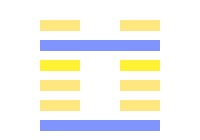
3.1.4.5 (3 > 16) - THE KUN HEXAGRAM
- 1. The first line, undivided, shows the difficulty (its subject has) in advancing. It will be advantageous for him to abide correct and firm; advantageous (also) to be made a feudal ruler.
- 4. The fourth line, divided, shows (its subject as a lady), the horses of whose chariot appear in retreat. She seeks, however, (the help of) him who seeks her to be his wife. Advance will be fortunate; all will turn out advantageously.
- 5. The fifth line, undivided, shows the difficulties in the way of (its subject's) dispensing the rich favours that might be expected from him. With firmness and correctness there will be good fortune in small things; (even) with them in great things there will be evil.
3.1.4.5 (3 > 16) - Going to see on the field
One starts by making studies before coming up with a theory.
Bing DeepL Google Yandex3.1.4.5 (3 > 16) - Going to see on the field
One starts by making studies before coming up with a theory.
Bing DeepL Google Yandex3.1.4.5 (3 > 16) - T’un, la difficulté initiale
T’un et tchun : A. 1. Bourgeon, pousse ; 2. Croissance, activité ; 3. Grandir, avancer. — B. Difficultés, arrêté dans son avancement, échec.
- 1. Pour s’établir solidement, il faut se maintenir en fermeté et droiture. (Pour maintenir le royaume), il est bon de constituer des chefs féodaux. Bien qu’on ait des difficultés, la volonté doit toujours s’attacher au devoir. Si, bien qu’élevé, on condescend aux besoins des petits, on s’attachera fortement le peuple.
-
4. Si elle est demandée en mariage selon les rites, qu’elle y aille et ce sera bien. Cela lui sera avantageux.
Il en est de même de l’équipage arrêté qui reprend sa course. -
5. Dans le développement de la sève des bourgeons, si elle se répand modérément, la croissance sera heureuse ; si elle se répand trop, le croissance sera empêchée.
Il en est ainsi si elle se répand avant d’être suffisamment riche et forte.
Obstacle au développement : s’il est petit, l’issue peut être heureuse ; s’il est grand, fin malheureuse.
3.1.4.5 (3 > 16) - Aller voir sur le terrain
On commence par faire des études avant d'avancer une théorie.
Bing DeepL Google Yandex3.1.4.5 (3 > 16) - Megoldás
- 1. Példamutató ha valaki mások segítségére siet a nehézségek ellenére.
- 4. Segítséget kap ha kivárja a sorát.
- 5. Tudni akar mielőtt döntene.

3.2.4.5 (3 > 54) - THE KUN HEXAGRAM
- 2. The second line, divided, shows (its subject) distressed and obliged to return; (even) the horses of her chariot (also) seem to be retreating. (But) not by a spoiler (is she assailed), but by one who seeks her to be his wife. The young lady maintains her firm correctness, and declines a union. After ten years she will be united, and have children.
- 4. The fourth line, divided, shows (its subject as a lady), the horses of whose chariot appear in retreat. She seeks, however, (the help of) him who seeks her to be his wife. Advance will be fortunate; all will turn out advantageously.
- 5. The fifth line, undivided, shows the difficulties in the way of (its subject's) dispensing the rich favours that might be expected from him. With firmness and correctness there will be good fortune in small things; (even) with them in great things there will be evil.
3.2.4.5 (3 > 54) - Resolving difficulties
One receives an action plan that will have unforeseen consequences.
Bing DeepL Google Yandex3.2.4.5 (3 > 54) - Resolving difficulties
One receives an action plan that will have unforeseen consequences.
Bing DeepL Google Yandex3.2.4.5 (3 > 54) - T’un, la difficulté initiale
T’un et tchun : A. 1. Bourgeon, pousse ; 2. Croissance, activité ; 3. Grandir, avancer. — B. Difficultés, arrêté dans son avancement, échec.
-
2. 2a. Tchun est comme arrêté par les difficultés, comme un cavalier dont le cheval veut reculer (ou : un cheval monté qui veut...).
2b. C’est comme la jeune fille qui veut épouser un brigand ravisseur, elle doit rester inébranlable et attendre (plutôt) dix ans. (Malgré cela), elle pourra alors se marier et être mère. (Il est ici question de difficultés.)
Un équipage solide, l’enfantement après dix ans indique le retour à la prospérité, à l’avancement. -
4. Si elle est demandée en mariage selon les rites, qu’elle y aille et ce sera bien. Cela lui sera avantageux.
Il en est de même de l’équipage arrêté qui reprend sa course. -
5. Dans le développement de la sève des bourgeons, si elle se répand modérément, la croissance sera heureuse ; si elle se répand trop, le croissance sera empêchée.
Il en est ainsi si elle se répand avant d’être suffisamment riche et forte.
Obstacle au développement : s’il est petit, l’issue peut être heureuse ; s’il est grand, fin malheureuse.
3.2.4.5 (3 > 54) - Remédier aux difficultés
On reçoit un plan d'action qui aura des conséquences imprévues.
Bing DeepL Google Yandex3.2.4.5 (3 > 54) - Megoldás
- 2. Megbízható kapcsolatokat kell kialakítania mielőtt mások elfogadnák.
- 4. Segítséget kap ha kivárja a sorát.
- 5. Tudni akar mielőtt döntene.
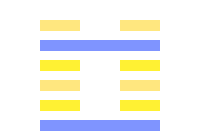
3.1.2.4.5 (3 > 40) - THE KUN HEXAGRAM
- 1. The first line, undivided, shows the difficulty (its subject has) in advancing. It will be advantageous for him to abide correct and firm; advantageous (also) to be made a feudal ruler.
- 2. The second line, divided, shows (its subject) distressed and obliged to return; (even) the horses of her chariot (also) seem to be retreating. (But) not by a spoiler (is she assailed), but by one who seeks her to be his wife. The young lady maintains her firm correctness, and declines a union. After ten years she will be united, and have children.
- 4. The fourth line, divided, shows (its subject as a lady), the horses of whose chariot appear in retreat. She seeks, however, (the help of) him who seeks her to be his wife. Advance will be fortunate; all will turn out advantageously.
- 5. The fifth line, undivided, shows the difficulties in the way of (its subject's) dispensing the rich favours that might be expected from him. With firmness and correctness there will be good fortune in small things; (even) with them in great things there will be evil.
3.1.2.4.5 (3 > 40) - Taking care of the weak first
One gives priority to the most needy.
Bing DeepL Google Yandex3.1.2.4.5 (3 > 40) - Taking care of the weak first
One gives priority to the most needy.
Bing DeepL Google Yandex3.1.2.4.5 (3 > 40) - T’un, la difficulté initiale
T’un et tchun : A. 1. Bourgeon, pousse ; 2. Croissance, activité ; 3. Grandir, avancer. — B. Difficultés, arrêté dans son avancement, échec.
- 1. Pour s’établir solidement, il faut se maintenir en fermeté et droiture. (Pour maintenir le royaume), il est bon de constituer des chefs féodaux. Bien qu’on ait des difficultés, la volonté doit toujours s’attacher au devoir. Si, bien qu’élevé, on condescend aux besoins des petits, on s’attachera fortement le peuple.
-
2. 2a. Tchun est comme arrêté par les difficultés, comme un cavalier dont le cheval veut reculer (ou : un cheval monté qui veut...).
2b. C’est comme la jeune fille qui veut épouser un brigand ravisseur, elle doit rester inébranlable et attendre (plutôt) dix ans. (Malgré cela), elle pourra alors se marier et être mère. (Il est ici question de difficultés.)
Un équipage solide, l’enfantement après dix ans indique le retour à la prospérité, à l’avancement. -
4. Si elle est demandée en mariage selon les rites, qu’elle y aille et ce sera bien. Cela lui sera avantageux.
Il en est de même de l’équipage arrêté qui reprend sa course. -
5. Dans le développement de la sève des bourgeons, si elle se répand modérément, la croissance sera heureuse ; si elle se répand trop, le croissance sera empêchée.
Il en est ainsi si elle se répand avant d’être suffisamment riche et forte.
Obstacle au développement : s’il est petit, l’issue peut être heureuse ; s’il est grand, fin malheureuse.
3.1.2.4.5 (3 > 40) - S'occuper d'abord des faibles
On place en priorité les plus nécessiteux.
Bing DeepL Google Yandex3.1.2.4.5 (3 > 40) - Megoldás
- 1. Példamutató ha valaki mások segítségére siet a nehézségek ellenére.
- 2. Megbízható kapcsolatokat kell kialakítania mielőtt mások elfogadnák.
- 4. Segítséget kap ha kivárja a sorát.
- 5. Tudni akar mielőtt döntene.

3.3.4.5 (3 > 55) - THE KUN HEXAGRAM
- 3. The third line, divided, shows one following the deer without (the guidance of) the forester, and only finding himself in the midst of the forest. The superior man, acquainted with the secret risks, thinks it better to give up the chase. If he went forward, he would regret it.
- 4. The fourth line, divided, shows (its subject as a lady), the horses of whose chariot appear in retreat. She seeks, however, (the help of) him who seeks her to be his wife. Advance will be fortunate; all will turn out advantageously.
- 5. The fifth line, undivided, shows the difficulties in the way of (its subject's) dispensing the rich favours that might be expected from him. With firmness and correctness there will be good fortune in small things; (even) with them in great things there will be evil.
3.3.4.5 (3 > 55) - Resolving difficulties
One knows that they will have things to say once others have finished.
Bing DeepL Google Yandex3.3.4.5 (3 > 55) - Resolving difficulties
One knows that they will have things to say once others have finished.
Bing DeepL Google Yandex3.3.4.5 (3 > 55) - T’un, la difficulté initiale
T’un et tchun : A. 1. Bourgeon, pousse ; 2. Croissance, activité ; 3. Grandir, avancer. — B. Difficultés, arrêté dans son avancement, échec.
-
3. Lorsque le gibier poursuivi s’enfonce inopinément dans une forêt profonde, le sage aime mieux l’abandonner que de s’exposer au danger. S’il l’y poursuit, il aura lieu de s’en repentir.
Il sera réduit à l’extrémité. -
4. Si elle est demandée en mariage selon les rites, qu’elle y aille et ce sera bien. Cela lui sera avantageux.
Il en est de même de l’équipage arrêté qui reprend sa course. -
5. Dans le développement de la sève des bourgeons, si elle se répand modérément, la croissance sera heureuse ; si elle se répand trop, le croissance sera empêchée.
Il en est ainsi si elle se répand avant d’être suffisamment riche et forte.
Obstacle au développement : s’il est petit, l’issue peut être heureuse ; s’il est grand, fin malheureuse.
3.3.4.5 (3 > 55) - Remédier aux difficultés
On sait que l'on aura des choses à dire une fois que les autres auront terminé.
Bing DeepL Google Yandex3.3.4.5 (3 > 55) - Megoldás
- 3. Magányosan halad ismeretlen terepen. Vezetőt kell keresnie vagy visszafordulnia.
- 4. Segítséget kap ha kivárja a sorát.
- 5. Tudni akar mielőtt döntene.
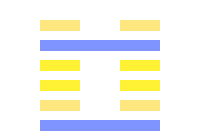
3.1.3.4.5 (3 > 62) - THE KUN HEXAGRAM
- 1. The first line, undivided, shows the difficulty (its subject has) in advancing. It will be advantageous for him to abide correct and firm; advantageous (also) to be made a feudal ruler.
- 3. The third line, divided, shows one following the deer without (the guidance of) the forester, and only finding himself in the midst of the forest. The superior man, acquainted with the secret risks, thinks it better to give up the chase. If he went forward, he would regret it.
- 4. The fourth line, divided, shows (its subject as a lady), the horses of whose chariot appear in retreat. She seeks, however, (the help of) him who seeks her to be his wife. Advance will be fortunate; all will turn out advantageously.
- 5. The fifth line, undivided, shows the difficulties in the way of (its subject's) dispensing the rich favours that might be expected from him. With firmness and correctness there will be good fortune in small things; (even) with them in great things there will be evil.
3.1.3.4.5 (3 > 62) - Resolving difficulties
One wants to compete against those who win every time, but those do not want to take up the challenge.
Bing DeepL Google Yandex3.1.3.4.5 (3 > 62) - Resolving difficulties
One wants to compete against those who win every time, but those do not want to take up the challenge.
Bing DeepL Google Yandex3.1.3.4.5 (3 > 62) - T’un, la difficulté initiale
T’un et tchun : A. 1. Bourgeon, pousse ; 2. Croissance, activité ; 3. Grandir, avancer. — B. Difficultés, arrêté dans son avancement, échec.
- 1. Pour s’établir solidement, il faut se maintenir en fermeté et droiture. (Pour maintenir le royaume), il est bon de constituer des chefs féodaux. Bien qu’on ait des difficultés, la volonté doit toujours s’attacher au devoir. Si, bien qu’élevé, on condescend aux besoins des petits, on s’attachera fortement le peuple.
-
3. Lorsque le gibier poursuivi s’enfonce inopinément dans une forêt profonde, le sage aime mieux l’abandonner que de s’exposer au danger. S’il l’y poursuit, il aura lieu de s’en repentir.
Il sera réduit à l’extrémité. -
4. Si elle est demandée en mariage selon les rites, qu’elle y aille et ce sera bien. Cela lui sera avantageux.
Il en est de même de l’équipage arrêté qui reprend sa course. -
5. Dans le développement de la sève des bourgeons, si elle se répand modérément, la croissance sera heureuse ; si elle se répand trop, le croissance sera empêchée.
Il en est ainsi si elle se répand avant d’être suffisamment riche et forte.
Obstacle au développement : s’il est petit, l’issue peut être heureuse ; s’il est grand, fin malheureuse.
3.1.3.4.5 (3 > 62) - Remédier aux difficultés
On souhaite se mesurer avec ceux qui gagnent tout le temps, mais ceux-là ne veulent pas relever le défi.
Bing DeepL Google Yandex3.1.3.4.5 (3 > 62) - Megoldás
- 1. Példamutató ha valaki mások segítségére siet a nehézségek ellenére.
- 3. Magányosan halad ismeretlen terepen. Vezetőt kell keresnie vagy visszafordulnia.
- 4. Segítséget kap ha kivárja a sorát.
- 5. Tudni akar mielőtt döntene.

3.2.3.4.5 (3 > 34) - THE KUN HEXAGRAM
- 2. The second line, divided, shows (its subject) distressed and obliged to return; (even) the horses of her chariot (also) seem to be retreating. (But) not by a spoiler (is she assailed), but by one who seeks her to be his wife. The young lady maintains her firm correctness, and declines a union. After ten years she will be united, and have children.
- 3. The third line, divided, shows one following the deer without (the guidance of) the forester, and only finding himself in the midst of the forest. The superior man, acquainted with the secret risks, thinks it better to give up the chase. If he went forward, he would regret it.
- 4. The fourth line, divided, shows (its subject as a lady), the horses of whose chariot appear in retreat. She seeks, however, (the help of) him who seeks her to be his wife. Advance will be fortunate; all will turn out advantageously.
- 5. The fifth line, undivided, shows the difficulties in the way of (its subject's) dispensing the rich favours that might be expected from him. With firmness and correctness there will be good fortune in small things; (even) with them in great things there will be evil.
3.2.3.4.5 (3 > 34) - Resolving difficulties
One acts as if others did not hear.
Bing DeepL Google Yandex3.2.3.4.5 (3 > 34) - Resolving difficulties
One acts as if others did not hear.
Bing DeepL Google Yandex3.2.3.4.5 (3 > 34) - T’un, la difficulté initiale
T’un et tchun : A. 1. Bourgeon, pousse ; 2. Croissance, activité ; 3. Grandir, avancer. — B. Difficultés, arrêté dans son avancement, échec.
-
2. 2a. Tchun est comme arrêté par les difficultés, comme un cavalier dont le cheval veut reculer (ou : un cheval monté qui veut...).
2b. C’est comme la jeune fille qui veut épouser un brigand ravisseur, elle doit rester inébranlable et attendre (plutôt) dix ans. (Malgré cela), elle pourra alors se marier et être mère. (Il est ici question de difficultés.)
Un équipage solide, l’enfantement après dix ans indique le retour à la prospérité, à l’avancement. -
3. Lorsque le gibier poursuivi s’enfonce inopinément dans une forêt profonde, le sage aime mieux l’abandonner que de s’exposer au danger. S’il l’y poursuit, il aura lieu de s’en repentir.
Il sera réduit à l’extrémité. -
4. Si elle est demandée en mariage selon les rites, qu’elle y aille et ce sera bien. Cela lui sera avantageux.
Il en est de même de l’équipage arrêté qui reprend sa course. -
5. Dans le développement de la sève des bourgeons, si elle se répand modérément, la croissance sera heureuse ; si elle se répand trop, le croissance sera empêchée.
Il en est ainsi si elle se répand avant d’être suffisamment riche et forte.
Obstacle au développement : s’il est petit, l’issue peut être heureuse ; s’il est grand, fin malheureuse.
3.2.3.4.5 (3 > 34) - Remédier aux difficultés
On fait comme si les autres n'avaient pas entendu.
Bing DeepL Google Yandex3.2.3.4.5 (3 > 34) - Megoldás
- 2. Megbízható kapcsolatokat kell kialakítania mielőtt mások elfogadnák.
- 3. Magányosan halad ismeretlen terepen. Vezetőt kell keresnie vagy visszafordulnia.
- 4. Segítséget kap ha kivárja a sorát.
- 5. Tudni akar mielőtt döntene.
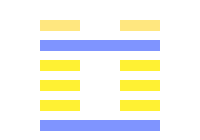
3.1.2.3.4.5 (3 > 32) - THE KUN HEXAGRAM
- 1. The first line, undivided, shows the difficulty (its subject has) in advancing. It will be advantageous for him to abide correct and firm; advantageous (also) to be made a feudal ruler.
- 2. The second line, divided, shows (its subject) distressed and obliged to return; (even) the horses of her chariot (also) seem to be retreating. (But) not by a spoiler (is she assailed), but by one who seeks her to be his wife. The young lady maintains her firm correctness, and declines a union. After ten years she will be united, and have children.
- 3. The third line, divided, shows one following the deer without (the guidance of) the forester, and only finding himself in the midst of the forest. The superior man, acquainted with the secret risks, thinks it better to give up the chase. If he went forward, he would regret it.
- 4. The fourth line, divided, shows (its subject as a lady), the horses of whose chariot appear in retreat. She seeks, however, (the help of) him who seeks her to be his wife. Advance will be fortunate; all will turn out advantageously.
- 5. The fifth line, undivided, shows the difficulties in the way of (its subject's) dispensing the rich favours that might be expected from him. With firmness and correctness there will be good fortune in small things; (even) with them in great things there will be evil.
3.1.2.3.4.5 (3 > 32) - To wait before declaring a winner
One wants to take their time before declaring that others have succeeded.
Bing DeepL Google Yandex3.1.2.3.4.5 (3 > 32) - To wait before declaring a winner
One wants to take their time before declaring that others have succeeded.
Bing DeepL Google Yandex3.1.2.3.4.5 (3 > 32) - T’un, la difficulté initiale
T’un et tchun : A. 1. Bourgeon, pousse ; 2. Croissance, activité ; 3. Grandir, avancer. — B. Difficultés, arrêté dans son avancement, échec.
- 1. Pour s’établir solidement, il faut se maintenir en fermeté et droiture. (Pour maintenir le royaume), il est bon de constituer des chefs féodaux. Bien qu’on ait des difficultés, la volonté doit toujours s’attacher au devoir. Si, bien qu’élevé, on condescend aux besoins des petits, on s’attachera fortement le peuple.
-
2. 2a. Tchun est comme arrêté par les difficultés, comme un cavalier dont le cheval veut reculer (ou : un cheval monté qui veut...).
2b. C’est comme la jeune fille qui veut épouser un brigand ravisseur, elle doit rester inébranlable et attendre (plutôt) dix ans. (Malgré cela), elle pourra alors se marier et être mère. (Il est ici question de difficultés.)
Un équipage solide, l’enfantement après dix ans indique le retour à la prospérité, à l’avancement. -
3. Lorsque le gibier poursuivi s’enfonce inopinément dans une forêt profonde, le sage aime mieux l’abandonner que de s’exposer au danger. S’il l’y poursuit, il aura lieu de s’en repentir.
Il sera réduit à l’extrémité. -
4. Si elle est demandée en mariage selon les rites, qu’elle y aille et ce sera bien. Cela lui sera avantageux.
Il en est de même de l’équipage arrêté qui reprend sa course. -
5. Dans le développement de la sève des bourgeons, si elle se répand modérément, la croissance sera heureuse ; si elle se répand trop, le croissance sera empêchée.
Il en est ainsi si elle se répand avant d’être suffisamment riche et forte.
Obstacle au développement : s’il est petit, l’issue peut être heureuse ; s’il est grand, fin malheureuse.
3.1.2.3.4.5 (3 > 32) - Attendre avant de déclarer un vainqueur
On veut prendre son temps avant de déclarer que les autres ont réussi.
Bing DeepL Google Yandex3.1.2.3.4.5 (3 > 32) - Megoldás
- 1. Példamutató ha valaki mások segítségére siet a nehézségek ellenére.
- 2. Megbízható kapcsolatokat kell kialakítania mielőtt mások elfogadnák.
- 3. Magányosan halad ismeretlen terepen. Vezetőt kell keresnie vagy visszafordulnia.
- 4. Segítséget kap ha kivárja a sorát.
- 5. Tudni akar mielőtt döntene.

3.4.6 (3 > 25) - THE KUN HEXAGRAM
- 4. The fourth line, divided, shows (its subject as a lady), the horses of whose chariot appear in retreat. She seeks, however, (the help of) him who seeks her to be his wife. Advance will be fortunate; all will turn out advantageously.
- 6. The topmost line, divided, shows (its subject) with the horses of his chariot obliged to retreat, and weeping tears of blood in streams.
3.4.6 (3 > 25) - Tagging the way
One marks their path so as to find their friends.
Bing DeepL Google Yandex3.4.6 (3 > 25) - Tagging the way
One marks their path so as to find their friends.
Bing DeepL Google Yandex3.4.6 (3 > 25) - T’un, la difficulté initiale
T’un et tchun : A. 1. Bourgeon, pousse ; 2. Croissance, activité ; 3. Grandir, avancer. — B. Difficultés, arrêté dans son avancement, échec.
-
4. Si elle est demandée en mariage selon les rites, qu’elle y aille et ce sera bien. Cela lui sera avantageux.
Il en est de même de l’équipage arrêté qui reprend sa course. - 6. L’avancement, arrêté comme un cheval monté qui recule, fait répandre des larmes amères et abondantes.
3.4.6 (3 > 25) - Baliser la route
On marque son chemin pour pouvoir retrouver ses amis.
Bing DeepL Google Yandex3.4.6 (3 > 25) - Megoldás
- 4. Segítséget kap ha kivárja a sorát.
- 6. Egyedül folytatja tovább mert mások biztosítékokat akarnak mielőtt támogatnák a fejlesztéseket. Tétotvázás helyett meg kell változtatnia szomszédságát hogy túlléphessen a nehézségeken.

3.1.4.6 (3 > 12) - THE KUN HEXAGRAM
- 1. The first line, undivided, shows the difficulty (its subject has) in advancing. It will be advantageous for him to abide correct and firm; advantageous (also) to be made a feudal ruler.
- 4. The fourth line, divided, shows (its subject as a lady), the horses of whose chariot appear in retreat. She seeks, however, (the help of) him who seeks her to be his wife. Advance will be fortunate; all will turn out advantageously.
- 6. The topmost line, divided, shows (its subject) with the horses of his chariot obliged to retreat, and weeping tears of blood in streams.
3.1.4.6 (3 > 12) - Assuming one's sins
One is not going to be caught red-handed when they have done nothing.
Bing DeepL Google Yandex3.1.4.6 (3 > 12) - Assuming one's sins
One is not going to be caught red-handed when they have done nothing.
Bing DeepL Google Yandex3.1.4.6 (3 > 12) - T’un, la difficulté initiale
T’un et tchun : A. 1. Bourgeon, pousse ; 2. Croissance, activité ; 3. Grandir, avancer. — B. Difficultés, arrêté dans son avancement, échec.
- 1. Pour s’établir solidement, il faut se maintenir en fermeté et droiture. (Pour maintenir le royaume), il est bon de constituer des chefs féodaux. Bien qu’on ait des difficultés, la volonté doit toujours s’attacher au devoir. Si, bien qu’élevé, on condescend aux besoins des petits, on s’attachera fortement le peuple.
-
4. Si elle est demandée en mariage selon les rites, qu’elle y aille et ce sera bien. Cela lui sera avantageux.
Il en est de même de l’équipage arrêté qui reprend sa course. - 6. L’avancement, arrêté comme un cheval monté qui recule, fait répandre des larmes amères et abondantes.
3.1.4.6 (3 > 12) - Assumer ses péchés
On ne va pas se faire prendre en flagrant délit quand on n'a rien fait.
Bing DeepL Google Yandex3.1.4.6 (3 > 12) - Megoldás
- 1. Példamutató ha valaki mások segítségére siet a nehézségek ellenére.
- 4. Segítséget kap ha kivárja a sorát.
- 6. Egyedül folytatja tovább mert mások biztosítékokat akarnak mielőtt támogatnák a fejlesztéseket. Tétotvázás helyett meg kell változtatnia szomszédságát hogy túlléphessen a nehézségeken.

3.2.4.6 (3 > 10) - THE KUN HEXAGRAM
- 2. The second line, divided, shows (its subject) distressed and obliged to return; (even) the horses of her chariot (also) seem to be retreating. (But) not by a spoiler (is she assailed), but by one who seeks her to be his wife. The young lady maintains her firm correctness, and declines a union. After ten years she will be united, and have children.
- 4. The fourth line, divided, shows (its subject as a lady), the horses of whose chariot appear in retreat. She seeks, however, (the help of) him who seeks her to be his wife. Advance will be fortunate; all will turn out advantageously.
- 6. The topmost line, divided, shows (its subject) with the horses of his chariot obliged to retreat, and weeping tears of blood in streams.
3.2.4.6 (3 > 10) - Resolving difficulties
One asks others to be silent when they talk.
Bing DeepL Google Yandex3.2.4.6 (3 > 10) - Resolving difficulties
One asks others to be silent when they talk.
Bing DeepL Google Yandex3.2.4.6 (3 > 10) - T’un, la difficulté initiale
T’un et tchun : A. 1. Bourgeon, pousse ; 2. Croissance, activité ; 3. Grandir, avancer. — B. Difficultés, arrêté dans son avancement, échec.
-
2. 2a. Tchun est comme arrêté par les difficultés, comme un cavalier dont le cheval veut reculer (ou : un cheval monté qui veut...).
2b. C’est comme la jeune fille qui veut épouser un brigand ravisseur, elle doit rester inébranlable et attendre (plutôt) dix ans. (Malgré cela), elle pourra alors se marier et être mère. (Il est ici question de difficultés.)
Un équipage solide, l’enfantement après dix ans indique le retour à la prospérité, à l’avancement. -
4. Si elle est demandée en mariage selon les rites, qu’elle y aille et ce sera bien. Cela lui sera avantageux.
Il en est de même de l’équipage arrêté qui reprend sa course. - 6. L’avancement, arrêté comme un cheval monté qui recule, fait répandre des larmes amères et abondantes.
3.2.4.6 (3 > 10) - Remédier aux difficultés
On demande aux autres de se taire quand on parle.
Bing DeepL Google Yandex3.2.4.6 (3 > 10) - Megoldás
- 2. Megbízható kapcsolatokat kell kialakítania mielőtt mások elfogadnák.
- 4. Segítséget kap ha kivárja a sorát.
- 6. Egyedül folytatja tovább mert mások biztosítékokat akarnak mielőtt támogatnák a fejlesztéseket. Tétotvázás helyett meg kell változtatnia szomszédságát hogy túlléphessen a nehézségeken.

3.1.2.4.6 (3 > 6) - THE KUN HEXAGRAM
- 1. The first line, undivided, shows the difficulty (its subject has) in advancing. It will be advantageous for him to abide correct and firm; advantageous (also) to be made a feudal ruler.
- 2. The second line, divided, shows (its subject) distressed and obliged to return; (even) the horses of her chariot (also) seem to be retreating. (But) not by a spoiler (is she assailed), but by one who seeks her to be his wife. The young lady maintains her firm correctness, and declines a union. After ten years she will be united, and have children.
- 4. The fourth line, divided, shows (its subject as a lady), the horses of whose chariot appear in retreat. She seeks, however, (the help of) him who seeks her to be his wife. Advance will be fortunate; all will turn out advantageously.
- 6. The topmost line, divided, shows (its subject) with the horses of his chariot obliged to retreat, and weeping tears of blood in streams.
3.1.2.4.6 (3 > 6) - Recalling the victories of the past
One continues, remembering that others have already succeeded.
Bing DeepL Google Yandex3.1.2.4.6 (3 > 6) - Recalling the victories of the past
One continues, remembering that others have already succeeded.
Bing DeepL Google Yandex3.1.2.4.6 (3 > 6) - T’un, la difficulté initiale
T’un et tchun : A. 1. Bourgeon, pousse ; 2. Croissance, activité ; 3. Grandir, avancer. — B. Difficultés, arrêté dans son avancement, échec.
- 1. Pour s’établir solidement, il faut se maintenir en fermeté et droiture. (Pour maintenir le royaume), il est bon de constituer des chefs féodaux. Bien qu’on ait des difficultés, la volonté doit toujours s’attacher au devoir. Si, bien qu’élevé, on condescend aux besoins des petits, on s’attachera fortement le peuple.
-
2. 2a. Tchun est comme arrêté par les difficultés, comme un cavalier dont le cheval veut reculer (ou : un cheval monté qui veut...).
2b. C’est comme la jeune fille qui veut épouser un brigand ravisseur, elle doit rester inébranlable et attendre (plutôt) dix ans. (Malgré cela), elle pourra alors se marier et être mère. (Il est ici question de difficultés.)
Un équipage solide, l’enfantement après dix ans indique le retour à la prospérité, à l’avancement. -
4. Si elle est demandée en mariage selon les rites, qu’elle y aille et ce sera bien. Cela lui sera avantageux.
Il en est de même de l’équipage arrêté qui reprend sa course. - 6. L’avancement, arrêté comme un cheval monté qui recule, fait répandre des larmes amères et abondantes.
3.1.2.4.6 (3 > 6) - Se rappeler les victoires du passé
On continue en se souvenant que les autres y sont déjà parvenus.
Bing DeepL Google Yandex3.1.2.4.6 (3 > 6) - Megoldás
- 1. Példamutató ha valaki mások segítségére siet a nehézségek ellenére.
- 2. Megbízható kapcsolatokat kell kialakítania mielőtt mások elfogadnák.
- 4. Segítséget kap ha kivárja a sorát.
- 6. Egyedül folytatja tovább mert mások biztosítékokat akarnak mielőtt támogatnák a fejlesztéseket. Tétotvázás helyett meg kell változtatnia szomszédságát hogy túlléphessen a nehézségeken.

3.3.4.6 (3 > 13) - THE KUN HEXAGRAM
- 3. The third line, divided, shows one following the deer without (the guidance of) the forester, and only finding himself in the midst of the forest. The superior man, acquainted with the secret risks, thinks it better to give up the chase. If he went forward, he would regret it.
- 4. The fourth line, divided, shows (its subject as a lady), the horses of whose chariot appear in retreat. She seeks, however, (the help of) him who seeks her to be his wife. Advance will be fortunate; all will turn out advantageously.
- 6. The topmost line, divided, shows (its subject) with the horses of his chariot obliged to retreat, and weeping tears of blood in streams.
3.3.4.6 (3 > 13) - Resolving difficulties
One thinks about preparing apologies for those who could not join the group.
Bing DeepL Google Yandex3.3.4.6 (3 > 13) - Resolving difficulties
One thinks about preparing apologies for those who could not join the group.
Bing DeepL Google Yandex3.3.4.6 (3 > 13) - T’un, la difficulté initiale
T’un et tchun : A. 1. Bourgeon, pousse ; 2. Croissance, activité ; 3. Grandir, avancer. — B. Difficultés, arrêté dans son avancement, échec.
-
3. Lorsque le gibier poursuivi s’enfonce inopinément dans une forêt profonde, le sage aime mieux l’abandonner que de s’exposer au danger. S’il l’y poursuit, il aura lieu de s’en repentir.
Il sera réduit à l’extrémité. -
4. Si elle est demandée en mariage selon les rites, qu’elle y aille et ce sera bien. Cela lui sera avantageux.
Il en est de même de l’équipage arrêté qui reprend sa course. - 6. L’avancement, arrêté comme un cheval monté qui recule, fait répandre des larmes amères et abondantes.
3.3.4.6 (3 > 13) - Remédier aux difficultés
On pense à préparer des excuses pour ceux qui n'ont pas pu rejoindre le groupe.
Bing DeepL Google Yandex3.3.4.6 (3 > 13) - Megoldás
- 3. Magányosan halad ismeretlen terepen. Vezetőt kell keresnie vagy visszafordulnia.
- 4. Segítséget kap ha kivárja a sorát.
- 6. Egyedül folytatja tovább mert mások biztosítékokat akarnak mielőtt támogatnák a fejlesztéseket. Tétotvázás helyett meg kell változtatnia szomszédságát hogy túlléphessen a nehézségeken.

3.1.3.4.6 (3 > 33) - THE KUN HEXAGRAM
- 1. The first line, undivided, shows the difficulty (its subject has) in advancing. It will be advantageous for him to abide correct and firm; advantageous (also) to be made a feudal ruler.
- 3. The third line, divided, shows one following the deer without (the guidance of) the forester, and only finding himself in the midst of the forest. The superior man, acquainted with the secret risks, thinks it better to give up the chase. If he went forward, he would regret it.
- 4. The fourth line, divided, shows (its subject as a lady), the horses of whose chariot appear in retreat. She seeks, however, (the help of) him who seeks her to be his wife. Advance will be fortunate; all will turn out advantageously.
- 6. The topmost line, divided, shows (its subject) with the horses of his chariot obliged to retreat, and weeping tears of blood in streams.
3.1.3.4.6 (3 > 33) - Resolving difficulties
One makes their own a motto that they have heard elsewhere.
Bing DeepL Google Yandex3.1.3.4.6 (3 > 33) - Resolving difficulties
One makes their own a motto that they have heard elsewhere.
Bing DeepL Google Yandex3.1.3.4.6 (3 > 33) - T’un, la difficulté initiale
T’un et tchun : A. 1. Bourgeon, pousse ; 2. Croissance, activité ; 3. Grandir, avancer. — B. Difficultés, arrêté dans son avancement, échec.
- 1. Pour s’établir solidement, il faut se maintenir en fermeté et droiture. (Pour maintenir le royaume), il est bon de constituer des chefs féodaux. Bien qu’on ait des difficultés, la volonté doit toujours s’attacher au devoir. Si, bien qu’élevé, on condescend aux besoins des petits, on s’attachera fortement le peuple.
-
3. Lorsque le gibier poursuivi s’enfonce inopinément dans une forêt profonde, le sage aime mieux l’abandonner que de s’exposer au danger. S’il l’y poursuit, il aura lieu de s’en repentir.
Il sera réduit à l’extrémité. -
4. Si elle est demandée en mariage selon les rites, qu’elle y aille et ce sera bien. Cela lui sera avantageux.
Il en est de même de l’équipage arrêté qui reprend sa course. - 6. L’avancement, arrêté comme un cheval monté qui recule, fait répandre des larmes amères et abondantes.
3.1.3.4.6 (3 > 33) - Remédier aux difficultés
On fait sienne une devise que l'on a entendue ailleurs.
Bing DeepL Google Yandex3.1.3.4.6 (3 > 33) - Megoldás
- 1. Példamutató ha valaki mások segítségére siet a nehézségek ellenére.
- 3. Magányosan halad ismeretlen terepen. Vezetőt kell keresnie vagy visszafordulnia.
- 4. Segítséget kap ha kivárja a sorát.
- 6. Egyedül folytatja tovább mert mások biztosítékokat akarnak mielőtt támogatnák a fejlesztéseket. Tétotvázás helyett meg kell változtatnia szomszédságát hogy túlléphessen a nehézségeken.

3.2.3.4.6 (3 > 1) - THE KUN HEXAGRAM
- 2. The second line, divided, shows (its subject) distressed and obliged to return; (even) the horses of her chariot (also) seem to be retreating. (But) not by a spoiler (is she assailed), but by one who seeks her to be his wife. The young lady maintains her firm correctness, and declines a union. After ten years she will be united, and have children.
- 3. The third line, divided, shows one following the deer without (the guidance of) the forester, and only finding himself in the midst of the forest. The superior man, acquainted with the secret risks, thinks it better to give up the chase. If he went forward, he would regret it.
- 4. The fourth line, divided, shows (its subject as a lady), the horses of whose chariot appear in retreat. She seeks, however, (the help of) him who seeks her to be his wife. Advance will be fortunate; all will turn out advantageously.
- 6. The topmost line, divided, shows (its subject) with the horses of his chariot obliged to retreat, and weeping tears of blood in streams.
3.2.3.4.6 (3 > 1) - Overcoming one's fears
One needs to question the others before they can free oneself from their anxieties.
Bing DeepL Google Yandex3.2.3.4.6 (3 > 1) - Overcoming one's fears
One needs to question the others before they can free oneself from their anxieties.
Bing DeepL Google Yandex3.2.3.4.6 (3 > 1) - T’un, la difficulté initiale
T’un et tchun : A. 1. Bourgeon, pousse ; 2. Croissance, activité ; 3. Grandir, avancer. — B. Difficultés, arrêté dans son avancement, échec.
-
2. 2a. Tchun est comme arrêté par les difficultés, comme un cavalier dont le cheval veut reculer (ou : un cheval monté qui veut...).
2b. C’est comme la jeune fille qui veut épouser un brigand ravisseur, elle doit rester inébranlable et attendre (plutôt) dix ans. (Malgré cela), elle pourra alors se marier et être mère. (Il est ici question de difficultés.)
Un équipage solide, l’enfantement après dix ans indique le retour à la prospérité, à l’avancement. -
3. Lorsque le gibier poursuivi s’enfonce inopinément dans une forêt profonde, le sage aime mieux l’abandonner que de s’exposer au danger. S’il l’y poursuit, il aura lieu de s’en repentir.
Il sera réduit à l’extrémité. -
4. Si elle est demandée en mariage selon les rites, qu’elle y aille et ce sera bien. Cela lui sera avantageux.
Il en est de même de l’équipage arrêté qui reprend sa course. - 6. L’avancement, arrêté comme un cheval monté qui recule, fait répandre des larmes amères et abondantes.
3.2.3.4.6 (3 > 1) - Surmonter ses craintes
On doit interroger les autres avant de pouvoir se libérer de ses angoisses.
Bing DeepL Google Yandex3.2.3.4.6 (3 > 1) - Megoldás
- 2. Megbízható kapcsolatokat kell kialakítania mielőtt mások elfogadnák.
- 3. Magányosan halad ismeretlen terepen. Vezetőt kell keresnie vagy visszafordulnia.
- 4. Segítséget kap ha kivárja a sorát.
- 6. Egyedül folytatja tovább mert mások biztosítékokat akarnak mielőtt támogatnák a fejlesztéseket. Tétotvázás helyett meg kell változtatnia szomszédságát hogy túlléphessen a nehézségeken.

3.1.2.3.4.6 (3 > 44) - THE KUN HEXAGRAM
- 1. The first line, undivided, shows the difficulty (its subject has) in advancing. It will be advantageous for him to abide correct and firm; advantageous (also) to be made a feudal ruler.
- 2. The second line, divided, shows (its subject) distressed and obliged to return; (even) the horses of her chariot (also) seem to be retreating. (But) not by a spoiler (is she assailed), but by one who seeks her to be his wife. The young lady maintains her firm correctness, and declines a union. After ten years she will be united, and have children.
- 3. The third line, divided, shows one following the deer without (the guidance of) the forester, and only finding himself in the midst of the forest. The superior man, acquainted with the secret risks, thinks it better to give up the chase. If he went forward, he would regret it.
- 4. The fourth line, divided, shows (its subject as a lady), the horses of whose chariot appear in retreat. She seeks, however, (the help of) him who seeks her to be his wife. Advance will be fortunate; all will turn out advantageously.
- 6. The topmost line, divided, shows (its subject) with the horses of his chariot obliged to retreat, and weeping tears of blood in streams.
3.1.2.3.4.6 (3 > 44) - Resolving difficulties
One becomes a schemer to indulge their most guilty instincts.
Bing DeepL Google Yandex3.1.2.3.4.6 (3 > 44) - Resolving difficulties
One becomes a schemer to indulge their most guilty instincts.
Bing DeepL Google Yandex3.1.2.3.4.6 (3 > 44) - T’un, la difficulté initiale
T’un et tchun : A. 1. Bourgeon, pousse ; 2. Croissance, activité ; 3. Grandir, avancer. — B. Difficultés, arrêté dans son avancement, échec.
- 1. Pour s’établir solidement, il faut se maintenir en fermeté et droiture. (Pour maintenir le royaume), il est bon de constituer des chefs féodaux. Bien qu’on ait des difficultés, la volonté doit toujours s’attacher au devoir. Si, bien qu’élevé, on condescend aux besoins des petits, on s’attachera fortement le peuple.
-
2. 2a. Tchun est comme arrêté par les difficultés, comme un cavalier dont le cheval veut reculer (ou : un cheval monté qui veut...).
2b. C’est comme la jeune fille qui veut épouser un brigand ravisseur, elle doit rester inébranlable et attendre (plutôt) dix ans. (Malgré cela), elle pourra alors se marier et être mère. (Il est ici question de difficultés.)
Un équipage solide, l’enfantement après dix ans indique le retour à la prospérité, à l’avancement. -
3. Lorsque le gibier poursuivi s’enfonce inopinément dans une forêt profonde, le sage aime mieux l’abandonner que de s’exposer au danger. S’il l’y poursuit, il aura lieu de s’en repentir.
Il sera réduit à l’extrémité. -
4. Si elle est demandée en mariage selon les rites, qu’elle y aille et ce sera bien. Cela lui sera avantageux.
Il en est de même de l’équipage arrêté qui reprend sa course. - 6. L’avancement, arrêté comme un cheval monté qui recule, fait répandre des larmes amères et abondantes.
3.1.2.3.4.6 (3 > 44) - Remédier aux difficultés
On devient intriguant pour satisfaire ses instincts les plus coupables.
Bing DeepL Google Yandex3.1.2.3.4.6 (3 > 44) - Megoldás
- 1. Példamutató ha valaki mások segítségére siet a nehézségek ellenére.
- 2. Megbízható kapcsolatokat kell kialakítania mielőtt mások elfogadnák.
- 3. Magányosan halad ismeretlen terepen. Vezetőt kell keresnie vagy visszafordulnia.
- 4. Segítséget kap ha kivárja a sorát.
- 6. Egyedül folytatja tovább mert mások biztosítékokat akarnak mielőtt támogatnák a fejlesztéseket. Tétotvázás helyett meg kell változtatnia szomszédságát hogy túlléphessen a nehézségeken.

3.4.5.6 (3 > 21) - THE KUN HEXAGRAM
- 4. The fourth line, divided, shows (its subject as a lady), the horses of whose chariot appear in retreat. She seeks, however, (the help of) him who seeks her to be his wife. Advance will be fortunate; all will turn out advantageously.
- 5. The fifth line, undivided, shows the difficulties in the way of (its subject's) dispensing the rich favours that might be expected from him. With firmness and correctness there will be good fortune in small things; (even) with them in great things there will be evil.
- 6. The topmost line, divided, shows (its subject) with the horses of his chariot obliged to retreat, and weeping tears of blood in streams.
3.4.5.6 (3 > 21) - Resolving difficulties
One makes reservations so that others remember what they have been told.
Bing DeepL Google Yandex3.4.5.6 (3 > 21) - Resolving difficulties
One makes reservations so that others remember what they have been told.
Bing DeepL Google Yandex3.4.5.6 (3 > 21) - T’un, la difficulté initiale
T’un et tchun : A. 1. Bourgeon, pousse ; 2. Croissance, activité ; 3. Grandir, avancer. — B. Difficultés, arrêté dans son avancement, échec.
-
4. Si elle est demandée en mariage selon les rites, qu’elle y aille et ce sera bien. Cela lui sera avantageux.
Il en est de même de l’équipage arrêté qui reprend sa course. -
5. Dans le développement de la sève des bourgeons, si elle se répand modérément, la croissance sera heureuse ; si elle se répand trop, le croissance sera empêchée.
Il en est ainsi si elle se répand avant d’être suffisamment riche et forte.
Obstacle au développement : s’il est petit, l’issue peut être heureuse ; s’il est grand, fin malheureuse. - 6. L’avancement, arrêté comme un cheval monté qui recule, fait répandre des larmes amères et abondantes.
3.4.5.6 (3 > 21) - Remédier aux difficultés
On fait des réserves pour que les autres se souviennent de ce qu'on leur a dit.
Bing DeepL Google Yandex3.4.5.6 (3 > 21) - Megoldás
- 4. Segítséget kap ha kivárja a sorát.
- 5. Tudni akar mielőtt döntene.
- 6. Egyedül folytatja tovább mert mások biztosítékokat akarnak mielőtt támogatnák a fejlesztéseket. Tétotvázás helyett meg kell változtatnia szomszédságát hogy túlléphessen a nehézségeken.
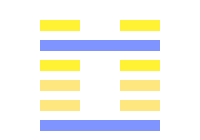
3.1.4.5.6 (3 > 35) - THE KUN HEXAGRAM
- 1. The first line, undivided, shows the difficulty (its subject has) in advancing. It will be advantageous for him to abide correct and firm; advantageous (also) to be made a feudal ruler.
- 4. The fourth line, divided, shows (its subject as a lady), the horses of whose chariot appear in retreat. She seeks, however, (the help of) him who seeks her to be his wife. Advance will be fortunate; all will turn out advantageously.
- 5. The fifth line, undivided, shows the difficulties in the way of (its subject's) dispensing the rich favours that might be expected from him. With firmness and correctness there will be good fortune in small things; (even) with them in great things there will be evil.
- 6. The topmost line, divided, shows (its subject) with the horses of his chariot obliged to retreat, and weeping tears of blood in streams.
3.1.4.5.6 (3 > 35) - Bypassing legislation
One enters a lawless area to be authorised to do what others do not want.
Bing DeepL Google Yandex3.1.4.5.6 (3 > 35) - Bypassing legislation
One enters a lawless area to be authorized to do what others do not want.
Bing DeepL Google Yandex3.1.4.5.6 (3 > 35) - T’un, la difficulté initiale
T’un et tchun : A. 1. Bourgeon, pousse ; 2. Croissance, activité ; 3. Grandir, avancer. — B. Difficultés, arrêté dans son avancement, échec.
- 1. Pour s’établir solidement, il faut se maintenir en fermeté et droiture. (Pour maintenir le royaume), il est bon de constituer des chefs féodaux. Bien qu’on ait des difficultés, la volonté doit toujours s’attacher au devoir. Si, bien qu’élevé, on condescend aux besoins des petits, on s’attachera fortement le peuple.
-
4. Si elle est demandée en mariage selon les rites, qu’elle y aille et ce sera bien. Cela lui sera avantageux.
Il en est de même de l’équipage arrêté qui reprend sa course. -
5. Dans le développement de la sève des bourgeons, si elle se répand modérément, la croissance sera heureuse ; si elle se répand trop, le croissance sera empêchée.
Il en est ainsi si elle se répand avant d’être suffisamment riche et forte.
Obstacle au développement : s’il est petit, l’issue peut être heureuse ; s’il est grand, fin malheureuse. - 6. L’avancement, arrêté comme un cheval monté qui recule, fait répandre des larmes amères et abondantes.
3.1.4.5.6 (3 > 35) - Contourner la législation
On entre dans une zone de non-droit pour être autorisé à faire ce que les autres ne veulent pas.
Bing DeepL Google Yandex3.1.4.5.6 (3 > 35) - Megoldás
- 1. Példamutató ha valaki mások segítségére siet a nehézségek ellenére.
- 4. Segítséget kap ha kivárja a sorát.
- 5. Tudni akar mielőtt döntene.
- 6. Egyedül folytatja tovább mert mások biztosítékokat akarnak mielőtt támogatnák a fejlesztéseket. Tétotvázás helyett meg kell változtatnia szomszédságát hogy túlléphessen a nehézségeken.

3.2.4.5.6 (3 > 38) - THE KUN HEXAGRAM
- 2. The second line, divided, shows (its subject) distressed and obliged to return; (even) the horses of her chariot (also) seem to be retreating. (But) not by a spoiler (is she assailed), but by one who seeks her to be his wife. The young lady maintains her firm correctness, and declines a union. After ten years she will be united, and have children.
- 4. The fourth line, divided, shows (its subject as a lady), the horses of whose chariot appear in retreat. She seeks, however, (the help of) him who seeks her to be his wife. Advance will be fortunate; all will turn out advantageously.
- 5. The fifth line, undivided, shows the difficulties in the way of (its subject's) dispensing the rich favours that might be expected from him. With firmness and correctness there will be good fortune in small things; (even) with them in great things there will be evil.
- 6. The topmost line, divided, shows (its subject) with the horses of his chariot obliged to retreat, and weeping tears of blood in streams.
3.2.4.5.6 (3 > 38) - Learning to avoid traps
One notices dividing lines that do not allow them to go where they want.
Bing DeepL Google Yandex3.2.4.5.6 (3 > 38) - Learning to avoid traps
One notices dividing lines that do not allow them to go where they want.
Bing DeepL Google Yandex3.2.4.5.6 (3 > 38) - T’un, la difficulté initiale
T’un et tchun : A. 1. Bourgeon, pousse ; 2. Croissance, activité ; 3. Grandir, avancer. — B. Difficultés, arrêté dans son avancement, échec.
-
2. 2a. Tchun est comme arrêté par les difficultés, comme un cavalier dont le cheval veut reculer (ou : un cheval monté qui veut...).
2b. C’est comme la jeune fille qui veut épouser un brigand ravisseur, elle doit rester inébranlable et attendre (plutôt) dix ans. (Malgré cela), elle pourra alors se marier et être mère. (Il est ici question de difficultés.)
Un équipage solide, l’enfantement après dix ans indique le retour à la prospérité, à l’avancement. -
4. Si elle est demandée en mariage selon les rites, qu’elle y aille et ce sera bien. Cela lui sera avantageux.
Il en est de même de l’équipage arrêté qui reprend sa course. -
5. Dans le développement de la sève des bourgeons, si elle se répand modérément, la croissance sera heureuse ; si elle se répand trop, le croissance sera empêchée.
Il en est ainsi si elle se répand avant d’être suffisamment riche et forte.
Obstacle au développement : s’il est petit, l’issue peut être heureuse ; s’il est grand, fin malheureuse. - 6. L’avancement, arrêté comme un cheval monté qui recule, fait répandre des larmes amères et abondantes.
3.2.4.5.6 (3 > 38) - Apprendre à éviter les pièges
On remarque des lignes séparatrices qui ne permettent pas d'aller où on veut.
Bing DeepL Google Yandex3.2.4.5.6 (3 > 38) - Megoldás
- 2. Megbízható kapcsolatokat kell kialakítania mielőtt mások elfogadnák.
- 4. Segítséget kap ha kivárja a sorát.
- 5. Tudni akar mielőtt döntene.
- 6. Egyedül folytatja tovább mert mások biztosítékokat akarnak mielőtt támogatnák a fejlesztéseket. Tétotvázás helyett meg kell változtatnia szomszédságát hogy túlléphessen a nehézségeken.
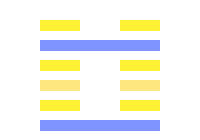
3.1.2.4.5.6 (3 > 64) - THE KUN HEXAGRAM
- 1. The first line, undivided, shows the difficulty (its subject has) in advancing. It will be advantageous for him to abide correct and firm; advantageous (also) to be made a feudal ruler.
- 2. The second line, divided, shows (its subject) distressed and obliged to return; (even) the horses of her chariot (also) seem to be retreating. (But) not by a spoiler (is she assailed), but by one who seeks her to be his wife. The young lady maintains her firm correctness, and declines a union. After ten years she will be united, and have children.
- 4. The fourth line, divided, shows (its subject as a lady), the horses of whose chariot appear in retreat. She seeks, however, (the help of) him who seeks her to be his wife. Advance will be fortunate; all will turn out advantageously.
- 5. The fifth line, undivided, shows the difficulties in the way of (its subject's) dispensing the rich favours that might be expected from him. With firmness and correctness there will be good fortune in small things; (even) with them in great things there will be evil.
- 6. The topmost line, divided, shows (its subject) with the horses of his chariot obliged to retreat, and weeping tears of blood in streams.
3.1.2.4.5.6 (3 > 64) - Resolving difficulties
One is regarded as being tender but they have some very clear-cut ideas in store.
Bing DeepL Google Yandex3.1.2.4.5.6 (3 > 64) - Resolving difficulties
One is regarded as being tender but they have some very clear-cut ideas in store.
Bing DeepL Google Yandex3.1.2.4.5.6 (3 > 64) - T’un, la difficulté initiale
T’un et tchun : A. 1. Bourgeon, pousse ; 2. Croissance, activité ; 3. Grandir, avancer. — B. Difficultés, arrêté dans son avancement, échec.
- 1. Pour s’établir solidement, il faut se maintenir en fermeté et droiture. (Pour maintenir le royaume), il est bon de constituer des chefs féodaux. Bien qu’on ait des difficultés, la volonté doit toujours s’attacher au devoir. Si, bien qu’élevé, on condescend aux besoins des petits, on s’attachera fortement le peuple.
-
2. 2a. Tchun est comme arrêté par les difficultés, comme un cavalier dont le cheval veut reculer (ou : un cheval monté qui veut...).
2b. C’est comme la jeune fille qui veut épouser un brigand ravisseur, elle doit rester inébranlable et attendre (plutôt) dix ans. (Malgré cela), elle pourra alors se marier et être mère. (Il est ici question de difficultés.)
Un équipage solide, l’enfantement après dix ans indique le retour à la prospérité, à l’avancement. -
4. Si elle est demandée en mariage selon les rites, qu’elle y aille et ce sera bien. Cela lui sera avantageux.
Il en est de même de l’équipage arrêté qui reprend sa course. -
5. Dans le développement de la sève des bourgeons, si elle se répand modérément, la croissance sera heureuse ; si elle se répand trop, le croissance sera empêchée.
Il en est ainsi si elle se répand avant d’être suffisamment riche et forte.
Obstacle au développement : s’il est petit, l’issue peut être heureuse ; s’il est grand, fin malheureuse. - 6. L’avancement, arrêté comme un cheval monté qui recule, fait répandre des larmes amères et abondantes.
3.1.2.4.5.6 (3 > 64) - Remédier aux difficultés
On passe pour être un tendre mais on a en réserve des idées bien tranchées.
Bing DeepL Google Yandex3.1.2.4.5.6 (3 > 64) - Megoldás
- 1. Példamutató ha valaki mások segítségére siet a nehézségek ellenére.
- 2. Megbízható kapcsolatokat kell kialakítania mielőtt mások elfogadnák.
- 4. Segítséget kap ha kivárja a sorát.
- 5. Tudni akar mielőtt döntene.
- 6. Egyedül folytatja tovább mert mások biztosítékokat akarnak mielőtt támogatnák a fejlesztéseket. Tétotvázás helyett meg kell változtatnia szomszédságát hogy túlléphessen a nehézségeken.

3.3.4.5.6 (3 > 30) - THE KUN HEXAGRAM
- 3. The third line, divided, shows one following the deer without (the guidance of) the forester, and only finding himself in the midst of the forest. The superior man, acquainted with the secret risks, thinks it better to give up the chase. If he went forward, he would regret it.
- 4. The fourth line, divided, shows (its subject as a lady), the horses of whose chariot appear in retreat. She seeks, however, (the help of) him who seeks her to be his wife. Advance will be fortunate; all will turn out advantageously.
- 5. The fifth line, undivided, shows the difficulties in the way of (its subject's) dispensing the rich favours that might be expected from him. With firmness and correctness there will be good fortune in small things; (even) with them in great things there will be evil.
- 6. The topmost line, divided, shows (its subject) with the horses of his chariot obliged to retreat, and weeping tears of blood in streams.
3.3.4.5.6 (3 > 30) - Resolving difficulties
One know the solution but others are not ready to accept it.
Bing DeepL Google Yandex3.3.4.5.6 (3 > 30) - Resolving difficulties
One know the solution but others are not ready to accept it.
Bing DeepL Google Yandex3.3.4.5.6 (3 > 30) - T’un, la difficulté initiale
T’un et tchun : A. 1. Bourgeon, pousse ; 2. Croissance, activité ; 3. Grandir, avancer. — B. Difficultés, arrêté dans son avancement, échec.
-
3. Lorsque le gibier poursuivi s’enfonce inopinément dans une forêt profonde, le sage aime mieux l’abandonner que de s’exposer au danger. S’il l’y poursuit, il aura lieu de s’en repentir.
Il sera réduit à l’extrémité. -
4. Si elle est demandée en mariage selon les rites, qu’elle y aille et ce sera bien. Cela lui sera avantageux.
Il en est de même de l’équipage arrêté qui reprend sa course. -
5. Dans le développement de la sève des bourgeons, si elle se répand modérément, la croissance sera heureuse ; si elle se répand trop, le croissance sera empêchée.
Il en est ainsi si elle se répand avant d’être suffisamment riche et forte.
Obstacle au développement : s’il est petit, l’issue peut être heureuse ; s’il est grand, fin malheureuse. - 6. L’avancement, arrêté comme un cheval monté qui recule, fait répandre des larmes amères et abondantes.
3.3.4.5.6 (3 > 30) - Remédier aux difficultés
On connait la solution mais les autres ne sont pas prêts à l'accepter.
Bing DeepL Google Yandex3.3.4.5.6 (3 > 30) - Megoldás
- 3. Magányosan halad ismeretlen terepen. Vezetőt kell keresnie vagy visszafordulnia.
- 4. Segítséget kap ha kivárja a sorát.
- 5. Tudni akar mielőtt döntene.
- 6. Egyedül folytatja tovább mert mások biztosítékokat akarnak mielőtt támogatnák a fejlesztéseket. Tétotvázás helyett meg kell változtatnia szomszédságát hogy túlléphessen a nehézségeken.
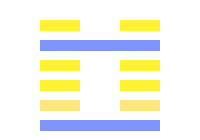
3.1.3.4.5.6 (3 > 56) - THE KUN HEXAGRAM
- 1. The first line, undivided, shows the difficulty (its subject has) in advancing. It will be advantageous for him to abide correct and firm; advantageous (also) to be made a feudal ruler.
- 3. The third line, divided, shows one following the deer without (the guidance of) the forester, and only finding himself in the midst of the forest. The superior man, acquainted with the secret risks, thinks it better to give up the chase. If he went forward, he would regret it.
- 4. The fourth line, divided, shows (its subject as a lady), the horses of whose chariot appear in retreat. She seeks, however, (the help of) him who seeks her to be his wife. Advance will be fortunate; all will turn out advantageously.
- 5. The fifth line, undivided, shows the difficulties in the way of (its subject's) dispensing the rich favours that might be expected from him. With firmness and correctness there will be good fortune in small things; (even) with them in great things there will be evil.
- 6. The topmost line, divided, shows (its subject) with the horses of his chariot obliged to retreat, and weeping tears of blood in streams.
3.1.3.4.5.6 (3 > 56) - Resolving difficulties
One knows well the temperament of the short-tempered so they say nothing.
Bing DeepL Google Yandex3.1.3.4.5.6 (3 > 56) - Resolving difficulties
One knows well the temperament of the short-tempered so they say nothing.
Bing DeepL Google Yandex3.1.3.4.5.6 (3 > 56) - T’un, la difficulté initiale
T’un et tchun : A. 1. Bourgeon, pousse ; 2. Croissance, activité ; 3. Grandir, avancer. — B. Difficultés, arrêté dans son avancement, échec.
- 1. Pour s’établir solidement, il faut se maintenir en fermeté et droiture. (Pour maintenir le royaume), il est bon de constituer des chefs féodaux. Bien qu’on ait des difficultés, la volonté doit toujours s’attacher au devoir. Si, bien qu’élevé, on condescend aux besoins des petits, on s’attachera fortement le peuple.
-
3. Lorsque le gibier poursuivi s’enfonce inopinément dans une forêt profonde, le sage aime mieux l’abandonner que de s’exposer au danger. S’il l’y poursuit, il aura lieu de s’en repentir.
Il sera réduit à l’extrémité. -
4. Si elle est demandée en mariage selon les rites, qu’elle y aille et ce sera bien. Cela lui sera avantageux.
Il en est de même de l’équipage arrêté qui reprend sa course. -
5. Dans le développement de la sève des bourgeons, si elle se répand modérément, la croissance sera heureuse ; si elle se répand trop, le croissance sera empêchée.
Il en est ainsi si elle se répand avant d’être suffisamment riche et forte.
Obstacle au développement : s’il est petit, l’issue peut être heureuse ; s’il est grand, fin malheureuse. - 6. L’avancement, arrêté comme un cheval monté qui recule, fait répandre des larmes amères et abondantes.
3.1.3.4.5.6 (3 > 56) - Remédier aux difficultés
On connait bien le tempérament des colériques alors on se tait.
Bing DeepL Google Yandex3.1.3.4.5.6 (3 > 56) - Megoldás
- 1. Példamutató ha valaki mások segítségére siet a nehézségek ellenére.
- 3. Magányosan halad ismeretlen terepen. Vezetőt kell keresnie vagy visszafordulnia.
- 4. Segítséget kap ha kivárja a sorát.
- 5. Tudni akar mielőtt döntene.
- 6. Egyedül folytatja tovább mert mások biztosítékokat akarnak mielőtt támogatnák a fejlesztéseket. Tétotvázás helyett meg kell változtatnia szomszédságát hogy túlléphessen a nehézségeken.

3.2.3.4.5.6 (3 > 14) - THE KUN HEXAGRAM
- 2. The second line, divided, shows (its subject) distressed and obliged to return; (even) the horses of her chariot (also) seem to be retreating. (But) not by a spoiler (is she assailed), but by one who seeks her to be his wife. The young lady maintains her firm correctness, and declines a union. After ten years she will be united, and have children.
- 3. The third line, divided, shows one following the deer without (the guidance of) the forester, and only finding himself in the midst of the forest. The superior man, acquainted with the secret risks, thinks it better to give up the chase. If he went forward, he would regret it.
- 4. The fourth line, divided, shows (its subject as a lady), the horses of whose chariot appear in retreat. She seeks, however, (the help of) him who seeks her to be his wife. Advance will be fortunate; all will turn out advantageously.
- 5. The fifth line, undivided, shows the difficulties in the way of (its subject's) dispensing the rich favours that might be expected from him. With firmness and correctness there will be good fortune in small things; (even) with them in great things there will be evil.
- 6. The topmost line, divided, shows (its subject) with the horses of his chariot obliged to retreat, and weeping tears of blood in streams.
3.2.3.4.5.6 (3 > 14) - Resolving difficulties
One spends time with those who could help them.
Bing DeepL Google Yandex3.2.3.4.5.6 (3 > 14) - Resolving difficulties
One spends time with those who could help them.
Bing DeepL Google Yandex3.2.3.4.5.6 (3 > 14) - T’un, la difficulté initiale
T’un et tchun : A. 1. Bourgeon, pousse ; 2. Croissance, activité ; 3. Grandir, avancer. — B. Difficultés, arrêté dans son avancement, échec.
-
2. 2a. Tchun est comme arrêté par les difficultés, comme un cavalier dont le cheval veut reculer (ou : un cheval monté qui veut...).
2b. C’est comme la jeune fille qui veut épouser un brigand ravisseur, elle doit rester inébranlable et attendre (plutôt) dix ans. (Malgré cela), elle pourra alors se marier et être mère. (Il est ici question de difficultés.)
Un équipage solide, l’enfantement après dix ans indique le retour à la prospérité, à l’avancement. -
3. Lorsque le gibier poursuivi s’enfonce inopinément dans une forêt profonde, le sage aime mieux l’abandonner que de s’exposer au danger. S’il l’y poursuit, il aura lieu de s’en repentir.
Il sera réduit à l’extrémité. -
4. Si elle est demandée en mariage selon les rites, qu’elle y aille et ce sera bien. Cela lui sera avantageux.
Il en est de même de l’équipage arrêté qui reprend sa course. -
5. Dans le développement de la sève des bourgeons, si elle se répand modérément, la croissance sera heureuse ; si elle se répand trop, le croissance sera empêchée.
Il en est ainsi si elle se répand avant d’être suffisamment riche et forte.
Obstacle au développement : s’il est petit, l’issue peut être heureuse ; s’il est grand, fin malheureuse. - 6. L’avancement, arrêté comme un cheval monté qui recule, fait répandre des larmes amères et abondantes.
3.2.3.4.5.6 (3 > 14) - Remédier aux difficultés
On passe du temps avec ceux qui pourraient nous aider.
Bing DeepL Google Yandex3.2.3.4.5.6 (3 > 14) - Megoldás
- 2. Megbízható kapcsolatokat kell kialakítania mielőtt mások elfogadnák.
- 3. Magányosan halad ismeretlen terepen. Vezetőt kell keresnie vagy visszafordulnia.
- 4. Segítséget kap ha kivárja a sorát.
- 5. Tudni akar mielőtt döntene.
- 6. Egyedül folytatja tovább mert mások biztosítékokat akarnak mielőtt támogatnák a fejlesztéseket. Tétotvázás helyett meg kell változtatnia szomszédságát hogy túlléphessen a nehézségeken.
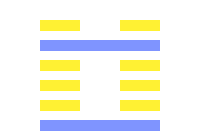
3.1.2.3.4.5.6 (3 > 50) - THE KUN HEXAGRAM
- 1. The first line, undivided, shows the difficulty (its subject has) in advancing. It will be advantageous for him to abide correct and firm; advantageous (also) to be made a feudal ruler.
- 2. The second line, divided, shows (its subject) distressed and obliged to return; (even) the horses of her chariot (also) seem to be retreating. (But) not by a spoiler (is she assailed), but by one who seeks her to be his wife. The young lady maintains her firm correctness, and declines a union. After ten years she will be united, and have children.
- 3. The third line, divided, shows one following the deer without (the guidance of) the forester, and only finding himself in the midst of the forest. The superior man, acquainted with the secret risks, thinks it better to give up the chase. If he went forward, he would regret it.
- 4. The fourth line, divided, shows (its subject as a lady), the horses of whose chariot appear in retreat. She seeks, however, (the help of) him who seeks her to be his wife. Advance will be fortunate; all will turn out advantageously.
- 5. The fifth line, undivided, shows the difficulties in the way of (its subject's) dispensing the rich favours that might be expected from him. With firmness and correctness there will be good fortune in small things; (even) with them in great things there will be evil.
- 6. The topmost line, divided, shows (its subject) with the horses of his chariot obliged to retreat, and weeping tears of blood in streams.
3.1.2.3.4.5.6 (3 > 50) - Resolving difficulties
Others want one to stand beside them.
Bing DeepL Google Yandex3.1.2.3.4.5.6 (3 > 50) - Resolving difficulties
Others want one to be involved with them.
Bing DeepL Google Yandex3.1.2.3.4.5.6 (3 > 50) - T’un, la difficulté initiale
T’un et tchun : A. 1. Bourgeon, pousse ; 2. Croissance, activité ; 3. Grandir, avancer. — B. Difficultés, arrêté dans son avancement, échec.
- 1. Pour s’établir solidement, il faut se maintenir en fermeté et droiture. (Pour maintenir le royaume), il est bon de constituer des chefs féodaux. Bien qu’on ait des difficultés, la volonté doit toujours s’attacher au devoir. Si, bien qu’élevé, on condescend aux besoins des petits, on s’attachera fortement le peuple.
-
2. 2a. Tchun est comme arrêté par les difficultés, comme un cavalier dont le cheval veut reculer (ou : un cheval monté qui veut...).
2b. C’est comme la jeune fille qui veut épouser un brigand ravisseur, elle doit rester inébranlable et attendre (plutôt) dix ans. (Malgré cela), elle pourra alors se marier et être mère. (Il est ici question de difficultés.)
Un équipage solide, l’enfantement après dix ans indique le retour à la prospérité, à l’avancement. -
3. Lorsque le gibier poursuivi s’enfonce inopinément dans une forêt profonde, le sage aime mieux l’abandonner que de s’exposer au danger. S’il l’y poursuit, il aura lieu de s’en repentir.
Il sera réduit à l’extrémité. -
4. Si elle est demandée en mariage selon les rites, qu’elle y aille et ce sera bien. Cela lui sera avantageux.
Il en est de même de l’équipage arrêté qui reprend sa course. -
5. Dans le développement de la sève des bourgeons, si elle se répand modérément, la croissance sera heureuse ; si elle se répand trop, le croissance sera empêchée.
Il en est ainsi si elle se répand avant d’être suffisamment riche et forte.
Obstacle au développement : s’il est petit, l’issue peut être heureuse ; s’il est grand, fin malheureuse. - 6. L’avancement, arrêté comme un cheval monté qui recule, fait répandre des larmes amères et abondantes.
3.1.2.3.4.5.6 (3 > 50) - Remédier aux difficultés
Les autres veulent que l'on s'engage à leur côté.
Bing DeepL Google Yandex3.1.2.3.4.5.6 (3 > 50) - Megoldás
- 1. Példamutató ha valaki mások segítségére siet a nehézségek ellenére.
- 2. Megbízható kapcsolatokat kell kialakítania mielőtt mások elfogadnák.
- 3. Magányosan halad ismeretlen terepen. Vezetőt kell keresnie vagy visszafordulnia.
- 4. Segítséget kap ha kivárja a sorát.
- 5. Tudni akar mielőtt döntene.
- 6. Egyedül folytatja tovább mert mások biztosítékokat akarnak mielőtt támogatnák a fejlesztéseket. Tétotvázás helyett meg kell változtatnia szomszédságát hogy túlléphessen a nehézségeken.

